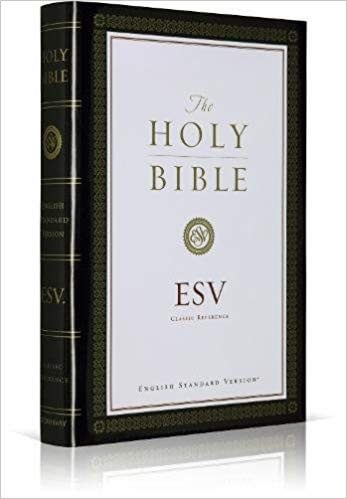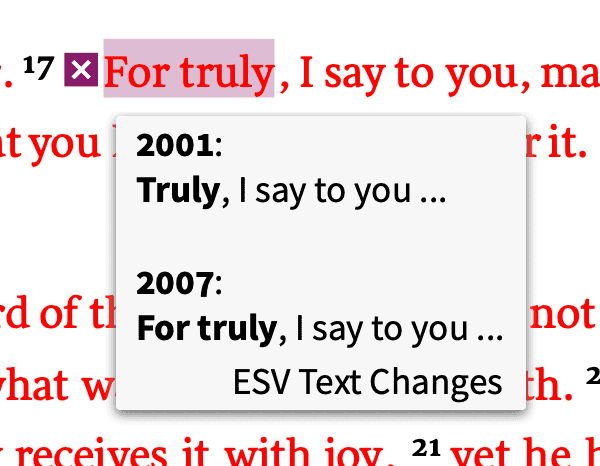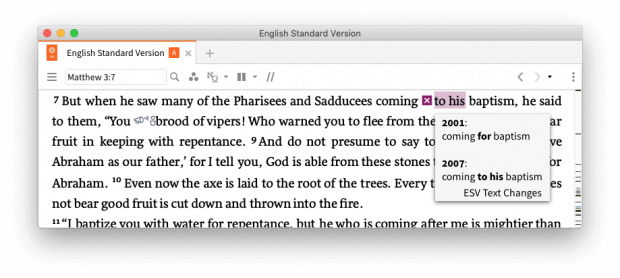The ESV came out in 2001, just as I was starting seminary. I bought one that was made of paper—the iconic black hardcover with a big white pane on the front. My roommate grabbed it and promptly spilled tea on it.

No problem: I now have probably 10 or 15 different copies of the ESV in various editions around my home and office. I’ve always loved the fact that it comes in so many creative, beautiful, and useful editions. Other things being equal (and they kind of are), I personally—not speaking for Logos here—think this is a good reason to choose the ESV as a church’s main pulpit Bible.*
But one complaint I’ve heard about the ESV—one that NIV users now make as well—is that it has changed since its initial release. People want a common standard for worship, for Scripture memory, for preaching. The fact that the ESV has been slightly revised four times in less than two decades—in 2007, 2010, 2011, and 2016—is unsettling to some Bible readers.
That 2016 edition, in fact, caused a bit of an uproar because it was called the “Permanent Text Edition.” The idea, until Crossway was forced by the laws of internet brouhaha to walk it back, was that the ESV would never be revised again. And I get why this happened. I think laypeople, especially (and understandably), want the text to be stable—or rather assume that it is. I think scholars, especially, want the freedom to make tweaks when the scholarship warrants it, or when the English language changes. I think pastors are stuck in the middle, appreciating the scholars’ viewpoint but also preferring to lead the flock by still waters. It was rock, paper, scissors. This time, paper won: the scholars, rightly, argued that English doesn’t stand still, and therefore neither should the ESV.
Lead the sheep by still waters
How can pastors resettle unsettled sheep? They can teach the principles I suggested when the Permanent Text edition was announced, and—now, using a free tool made by Logos user James Chaisson—they can let people see the changes easily for themselves. Just make sure you’re signed in to your Logos account in your web browser, click this link, click the “Action” button, then “Connect.” Now open up the ESV in Logos, click the visual filters button, and select the Notebook for “ESV Text Changes.” You’ll start to see little notes popping up in your ESV, like this:

How will this help you help others? By showing them 1) that the changes are minor and 2) that they are infrequent. Viewing the changes in context instead of in a list carries particular sheep-settling benefits. If someone comes to you, shepherd, and says, “Are you sure we should be using the ESV? I bought my son one, and we noticed that it’s different from mine!”, just pull up the tool and start scrolling.
If you choose a random spot in the OT, you might scroll for a long time before you hit a change. That in itself will send a powerful visual message. Page after page after page has no change whatsoever:

Starting in Lamentations, it took me a fair bit of scrolling till I got to my first change:
This one-word revision in Ezekiel 3:7 is so minor—and so very representative of the kinds of changes made in the various ESV editions. The revisers changed the way they split a sentence. They didn’t even change a word. That ought to help your sheep.
And if said sheep asks, “If this is so minor, why couldn’t they just leave it the same?” Then whip out a quote from the KJV translators:
As nothing is begun and perfected at the same time, and the latter thoughts are thought to be the wiser: so, if we building upon their foundation that went before us, and being helped by their labours, do endeavour to make that better which they left so good, no man, we are sure, hath cause to mislike us; they, we persuade ourselves, if they were alive, would thank us. (xxvii)
Start scrolling in Matthew 1:1, and you’ll meet your first change in chapter 3, at the baptism of John:

I could dig into the Greek here; maybe you could, too. But let’s avoid it for the moment, because people coming to your office probably can’t read Greek. Just on the level of English, is there any difference here? In many places of revision (see the previous example), there’s effectively no difference. But no matter the translators’ reason for the change—and let’s start with the presumption that they had a one or they wouldn’t have bothered—does the meaning of the sentence change? In this place, yes. The Pharisees and Sadducees are either coming to get baptized themselves or coming to watch (and, no doubt, make stink eyes) as others get baptized.
Now, is this something to be alarmed over? No. I think it is fair to ask people who don’t read Greek to trust that if translations differ like this, then God must have placed ambiguity in the text at this point. And what, really, is the difference between the two readings? Whether the Pharisees came with apparent humility or evident contempt, John still sees their wicked hearts. Having looked at the Greek, I do think the ESV translators made the right decision here. They left the RSV unchanged in 2001, but by 2007, they realized that the stink-eye option was more contextually likely. But the RSV’s (and ESV 2001’s) rendering is interesting: it adds a layer of narrative complexity that is worth exploring and considering.
The upshot: actually seeing 1) how much text is unchanged and 2) how minor and even piddling the changes are should help unsettled sheep. And sort of a subcategory to 2, seeing that there are places where God inspired ambiguity should help also. Translators into English have to choose one interpretation or the other, but rarely do such choices have doctrinal significance.
(Now, it is true that there were some more contentious changes in the 2016 ESV. Before a sheep comes asking, you might want to bone up on them. This one stands at the top of the list—no, it kind of is the list:

If someone asks you about this passage, do some reading in the commentaries. Understand the issues. Know the relevant cross references. Be gracious to Christians who have sincere reasons for taking various viewpoints on a difficult and obscure phrase that stands somewhere near the very heart of massive culture wars!
3 Lessons
Let me offer three lessons from the above exercise looking through a few changes in the ESV.
1. God doesn’t promise perfect Bible translations
First, I think our work above provides a healthy reminder of something I will keep going on about until my skin turns into TruTone® vinyl: the Bible does not promise us perfect translations, or even good ones. As the KJV translators themselves pointed out in their utterly brilliant preface, Jesus and the apostles were content to use the Septuagint, the Greek translation of the Hebrew Old Testament, despite its flaws. I am glad somebody cares enough about the ESV (and NIV and NET Bible and NASB and CSB, etc.) to look for minute ways to improve it.
If we’re not willing for this improvement to occur, what are we saying? At best, we’re saying that stability in my church outweighs getting Bible translation right. Stability and accuracy are two genuinely good things to value, but which one ought to weigh more? I think the latter. At worst, if we oppose Bible translation revision, we’re implying that a given translation is perfect. Little revisions are little reminders that we need to be occasionally unsettled. You don’t have to know Greek to know God, but there is a level of accuracy and specificity in biblical interpretation that requires knowledge of the original languages. Inspiration does not extend to translations anymore than it does to teachers. Translations are teachers: they teach us the Word of God.
2. There are weightier matters of the law
Second, Christian people often forget how much of the Bible is not remotely doctrinal. Using my magic computer arts (or rather, those of Random.org), I selected four random verses from the whole Bible. Wouldn’t you know I got a genealogy twice:
. . . Shamsherai, Shehariah, Athaliah . . . (1 Chron 8:26 ESV)
. . . and Obadiah the son of Shemaiah, son of Galal, son of Jeduthun, and Berechiah the son of Asa, son of Elkanah, who lived in the villages of the Netophathites. (1 Chron 9:16 ESV)
Who is wise and understanding among you? By his good conduct let him show his works in the meekness of wisdom. (James 3:13 ESV)
For I will be merciful toward their iniquities, and I will remember their sins no more. (Heb 8:12 ESV)
None of these verses contain changes in any ESV editions, by the way, and only one of them is what I’d call doctrinal. All contribute to doctrine as part of longer passages, but only the last states it directly. I am not devaluing the other statements or creating a canon within the canon. I’m saying that there are weightier matters of the law—that it really is okay, even preferable, to understand and memorize Romans 3:21–26 before you spend time learning to pronounce “Shamsherai.” Also, there are other passages that teach all the doctrines in any of these verses. The Bible comes with a good deal of fail-safe redundancy: indeed, that fourth passage is a quotation of an Old Testament text. So if a translator is clumsy in a given place, our Christian faith does not fall dead.
3. The same thing can be said with slightly different words
Third, Christian people often don’t realize how many different ways there are to say basically the same thing. If the English Bible we hold in our hands is full of magic words (like אברא קאט אברא; abra qat abra), then we change it at our peril. But the Bible itself, in the four Gospels, says the same thing in different ways:
Follow me, and I will make you fishers of men. (Matt 4:19)
Follow me, and I will make you become fishers of men. (Mark 1:17)
Would anyone argue that one of these quotations is in error because one word is “added” or “omitted” (depending on which Gospel you take as your standard)? Same meaning; slightly different words.
Or take those four random verses from above. Even the most doctrinal ones could all be stated (or spelled) a bit differently and yet say the same thing. That’s what the major English translations do.
Tell any sheep around you, “I’m going to change the Bible!” and they will shift uneasily, then go looking for another shepherd. But patiently explain to them why changes in Bible translations are necessary, and they’ll be better and more contented grass eaters.
*But watch out, Crossway, because other translations such as the NIV and CSB have been coming out in some beautiful editions, too! Even the nerdy NET Bible has a brand-new typeset with a custom typeface. I think Crossway has changed consumer expectations for the better when it comes to Bible design, and I’m grateful to them. When my team put out a Lexham English Septuagint in print, we most definitely looked closely at my favorite ESV edition as a successful model. We chose Pensum Pro as the typeface, however, and I think the result is both classy and useful.





